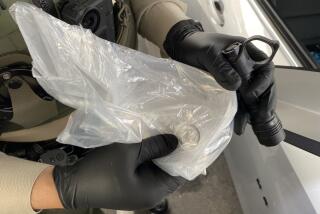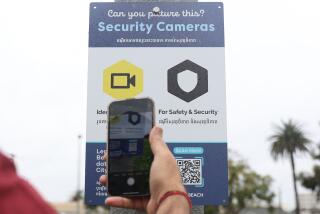Police tracking of cellphones raises concerns
You check in on Foursquare, post geotagged photos on Facebook and tweet every mundane detail of your life. You overshare. But do you really want the cops tracking your cellphone without your knowledge?
A recent review of law-enforcement practices by the American Civil Liberties Union revealed that itâs not uncommon for cellphones to be virtually tailed using either the phoneâs own GPS or cellular triangulation -- without obtaining a warrant or subpoena.
âThe overwhelming majority of the over 200 law enforcement agencies that provided documents engaged in at least some cellphone tracking â and many track cellphones quite frequently,â the ACLU found. And only 10 agencies said that they have never tracked cellphones.
The organization had its 35 affiliates across the country file 380 requests for documentation of policies and practices on tracking of cellphones. ACLU said it received responses from more than 200 police departments.
Among the more interesting examples were Lincoln, Neb., and Gilbert, Ariz. In Lincoln, police gain access to GPS data, which is more accurate than cell tower triangulation, without having to offer probable cause, the organization said. And the Gilbert Police Department went ahead and got their own cellphone-tracking technology, ACLU said.
Other agencies sought information about all the cellphone numbers that used the cell tower at a particular location in a given period.
That use was slightly different, said Joel R. Reidenberg, founding academic director of the Center on Law and Information Policy at Fordham University in New York. He said it was more akin to taking a photo of everyone at Grand Central Station.
Right about now youâre probably asking: What about the 4th Amendment to the U.S. Constitution, which says you need a warrant to search and you need probable cause to get a warrant?
Reidenberg points to United States v. Jones, which addressed GPS tracking without a warrant. While the justices held that law enforcement was essentially trespassing on private property by installing a device to track movements, they didnât really touch on tracking using cellphones. But, he said, the decision clearly indicates a great concern about 24-hour monitoring.
Although an argument can be made that âthe U.S. has a tradition of seeing oneâs activities in public as not having an expectation of privacy,â Reidenberg said, âthatâs now up in the air since technology provides the possibility of pervasive, 24-hour monitoring.â
In addition, Reidenberg said he found it disturbing that such tracking âenables others to learn systematically everywhere I go every time I step out of my door.â This takes activity in public that âmay become something thatâs privateâ -- a pattern of behavior.
Ultimately, it might verge on violating the 1st Amendmentâs protection of the freedom of association, he said.
Sure, a policeman could stand on a street corner and track your movements in person, though it sounds a bit like the KGB. Reidenberg asks: âWould we in a democratic society approve the budget to have police follow everyone? Democracy has checksâ on that kind of expensive proposal.
However, with technology, the cost is much less -- at least in terms of money.
RELATED:
Smartphone apps dial up privacy worries
Tech firmsâ data gathering worries Californians, poll finds
Consumer Reports, Times polls find broad data privacy concerns
Follow Michelle Maltais on Google+, Facebook or Twitter
Police tracking of cellphones raises concerns
More to Read
Inside the business of entertainment
The Wide Shot brings you news, analysis and insights on everything from streaming wars to production â and what it all means for the future.
You may occasionally receive promotional content from the Los Angeles Times.











